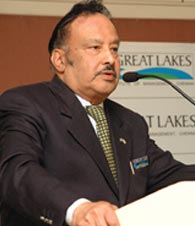|
Executive Interviews: Interview with Bala V Balachandran on Government and Business
December 2009
-
By Dr. Nagendra V Chowdary
Government and Business: The New
and Defining Moments -
Governments have responded
vigorously with their bailout
packages and that meant in one sense
private losses being funded by public
money. Henrique Abreu cited a
lesson of the late Milton Friedman
that ďit is a different thing spending
your money on someone else (Warren
Buffet) or spending someone elseís
money on someone else (government
intervention). What is the efficacy of
government bail outs, especially for
the scale of bailouts doled out?
It is clear no one wants to put good
money over bad money.
Governments sometimes tend to do
that as there may be a political Agenda
and the need to be reelected to power
is the driving force behind those
decisions. From an economic stand
point, you donít want to be emotional
and be only rational. In the battle
between politics and economics
finally good economics will win since
there is nothing called as good
politics!
-
American taxpayers have become
shareholders in AIG, GM, and so
forth. Whatís the exit strategy?
American taxpayers have no say and
need to follow what the government
they elected states and bids them do.
The exit strategy comes every four
years in the Presidential and
Congressional elections. The two
parties have different views of right
and wrong. Let the taxpayer decide.
This is like investing in stocks. There
are bad solutions and worse
solutions. There is no good solution.
Choose.
-
Regulatory reform will mean
higher capital requirements for
financial institutions. Wonít that limit
GDP growth?
Definitely yes. But what is the
alternative? Few unscrupulous
individuals make a huge short term
gain and other innocents who
skimped and saved money for the
childrenís education or marriage are
taken for a ride. Thus optimization is
impossible and thus satisfying is
optimal. Where the economy as a
whole is in shambles, the
government alone is in a position to
induce fiscal stimulus and if it is at
the cost of the GDP then so be it.
-
Instead of attempting to regulate
using a patchwork of agencies, is it
time for Bretton Woods II, i.e., should
there be a new and powerful
overarching body (as suggested by
UK Prime Minister, Gordon Brown)
controlling, monitoring and
regulating the international capital
flows? The aim of economic
regulation should be the same in all
sectors: to facilitate fair competition
among players or, where natural
monopolies exist, to ensure fair
pricing and service levels. Greater
competition means stronger
productivity growth, which in turn
means a faster-growing economy and
more wealth to share. Yet
governments everywhere struggle to
get regulation right. Unfortunately,
regulation often has a negative effect.
What can governments do to get it
right?
In each country, there are individuals
who are brilliant, extremely welleducated,
possess a decent amount of
wealth and have spearheaded quality
initiatives and public service and
have a superb reputation. For
example, MS Swaminathan on
Agricultural and Green Revolution,
Kurien on white Revolution and Milk
Production, Sam Pitroda on Telecom
Revolution and many others with
known competence of that country
including Dr. Raghuram Rajan of
University of Chicago. I am so glad
that Dr.Manmohan Singh, Dr. Montek
Singh Ahluwalia, Dr. Abdul Kalam,
and other leaders have identified
such people and invited them as
advisors as their competence, vision,
passion and devotion are
outstanding. India does not need big
deal consultants and I am confident
that the educated government does
indeed know what is right and also
how to go about doing it. So also in
the US or any country for that matter.
The question is execution.
Sometimes they donít go through
with it for political reasons or
sometimes the system has been so
messed up over the past like with
corruption etc., that we are unable to
execute the plans properly. However
in the last 10 years at least in India
regardless of the party, progress has
been made in a significant measure
and inclusive growth (even if out of
fear of Naxals) is in existence. In next
10 years the growth will be relatively
better and one can hope many things
can be executed through a
substantially less corrupt and
maligned system.
|
